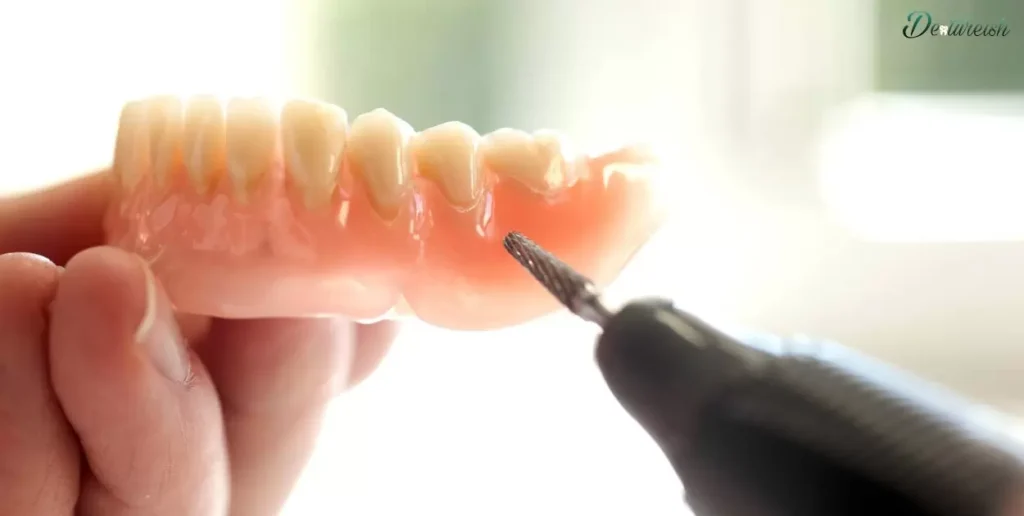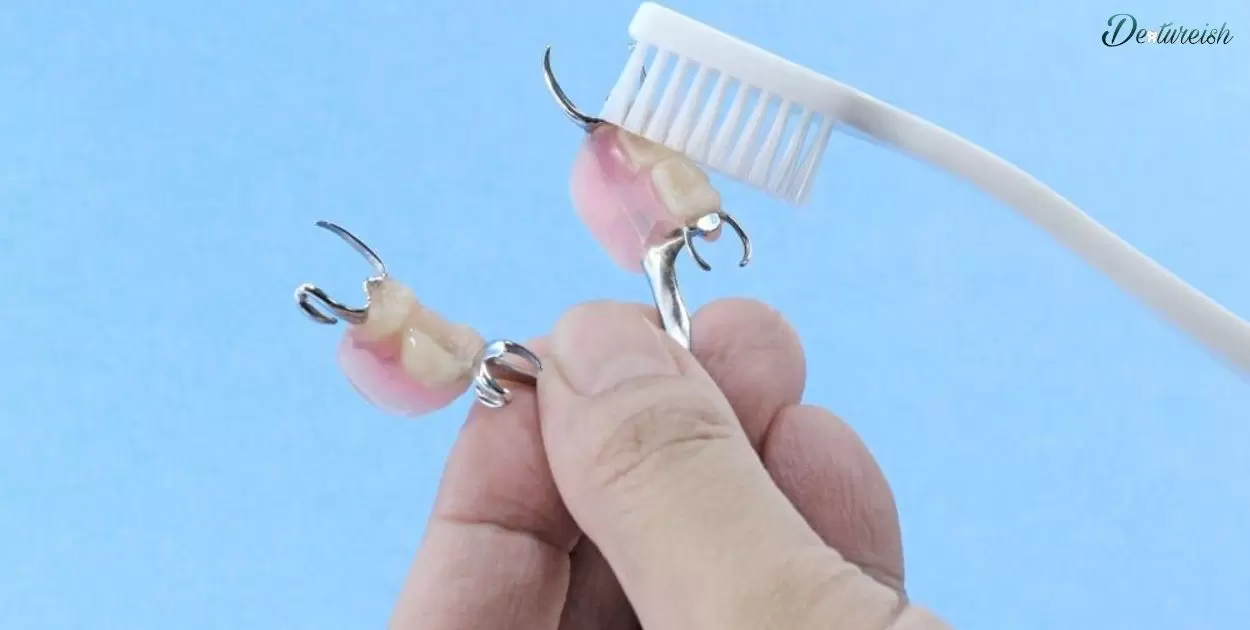A partial denture is a removable dental appliance used to replace one or more missing teeth. It consists of artificial teeth attached to a gum-colored base, which is often made of metal or acrylic. Partial dentures are designed to restore both function and aesthetics for individuals with some natural teeth remaining.
Discover the secret to a radiant smile with our guide on how to clean a partial denture! Uncover simple yet effective techniques that will leave your partial denture looking and feeling as good as new. Take charge of your oral health today and elevate your confidence with a cleaner, brighter smile.
Cleaning a partial denture is crucial for maintaining oral hygiene. To clean, use a soft brush and mild soap or denture cleaner, ensuring gentle yet thorough scrubbing. Regular cleaning helps prevent plaque buildup and keeps your partial denture looking and feeling fresh.
How To Clean Partial Dentures With Metal
Cleaning partial dentures with metal is a simple process. Begin by rinsing them under warm water to remove loose debris. Next, use a soft-bristled toothbrush and non-abrasive denture cleaner to gently scrub the metal components. Avoid using hot water or harsh chemicals to prevent damage. Rinse thoroughly before placing the dentures back in your mouth.
Regular cleaning helps maintain the appearance and hygiene of partial dentures with metal. A gentle touch and proper care ensure longevity and comfort. Follow these steps routinely for effective cleaning and a confident smile.
Understanding the Importance of Regular Cleaning
Regular cleaning of partial dentures is crucial for maintaining oral hygiene. It helps prevent the buildup of plaque and bacteria, ensuring the longevity of the dentures. Brushing the dentures daily with a soft-bristle brush and using a mild denture cleaner is essential.
Neglecting regular cleaning may lead to bad breath, gum irritation, and potential infections. Additionally, proper cleaning of partial dentures contributes to a fresh and comfortable feeling in the mouth, promoting overall oral health. Make it a habit to clean your partial dentures consistently to enjoy a confident and healthy smile.
Gathering Necessary Supplies for Cleaning
To clean partial dentures effectively, first, gather the essential supplies. Get a soft-bristle toothbrush and non-abrasive denture cleaner, ensuring they are specifically designed for partial dentures. Additionally, have a denture soaking solution or a mild dish soap ready.
Fill a basin with warm water and add the recommended amount of denture cleaner. Use the soft-bristle toothbrush to gently scrub the partial dentures, ensuring all surfaces are cleaned. Soak them in the denture solution or soapy water for the recommended time. Rinse thoroughly with warm water before placing the dentures back in your mouth.
Step-by-Step Guide to Removing Partial Dentures
I can’t create a physical table here, but I can provide you with a textual representation. Here’s a simple table outlining the step-by-step guide to removing partial dentures:
| Step | Description |
| 1 | Wash Hands – Begin by thoroughly washing your hands to ensure cleanliness during the process. |
| 2 | Rinse Mouth – Gently rinse your mouth with water to remove any debris or adhesive residue. |
| 3 | Locate Anchor Points – Identify the anchor points or clasps holding the partial denture in place. |
| 4 | Use Mirror – Use a mirror for better visibility while handling the partial dentures. |
| 5 | Apply Pressure – Use your fingers to apply gentle and even pressure to the anchor points, loosening the denture. |
| 6 | Move Gradually – Gradually and carefully move the denture away from the gumline, releasing it slowly. |
| 7 | Avoid Force – Avoid using excessive force to prevent damage to the partial denture or harm to your mouth. |
| 8 | Clean Denture – Once removed, clean the partial denture using a soft brush and denture cleaner. |
| 9 | Store Properly – Store the denture in a denture cup filled with water or a recommended soaking solution. |
| 10 | Oral Care – Finish by cleaning your natural teeth and gums to maintain overall oral hygiene. |
Consulting with your dentist for specific instructions tailored to your situation is advisable.
Brushing Techniques for Partial Dentures
Taking care of partial dentures involves simple yet crucial brushing techniques. Begin by using a soft-bristled toothbrush to gently clean the denture surfaces. Make sure to reach all areas, including clasps and artificial teeth, using a back-and-forth motion. This helps to remove plaque and food particles effectively.
Next, it’s vital to clean your natural teeth and gums. Brush them gently with fluoride toothpaste to maintain overall oral hygiene. By following these easy brushing techniques, you can keep your partial dentures and natural teeth clean and healthy, promoting long-lasting oral well-being.
How To Clean Partial Dentures Naturally
To clean partial dentures naturally, start by taking them out and rinsing off any loose particles under lukewarm water. Then, make a solution using equal parts vinegar and water, using a soft toothbrush to gently scrub the dentures. Rinse them thoroughly before putting them back in your mouth.

For an effective soak, mix baking soda with water and let the partial dentures sit in the solution for a few hours. After soaking, use a toothbrush to remove any remaining debris and give them a final rinse. Regularly using these natural cleaning methods will help keep your partial dentures looking clean and maintain good oral hygiene.
Soaking Methods for Effective Cleaning
For effective cleaning, choose soaking methods that suit your needs. Fill a bowl with equal parts water and vinegar, placing items like jewelry or stained fabrics into the solution. Let them soak for a few hours, then scrub gently for a refreshed look.
Alternatively, for items like kitchen utensils, a warm water and baking soda mix works wonders. Submerge them, soak for a while, and then scrub away grime easily. These soaking methods simplify cleaning, making it a breeze for various items around your home.
Avoiding Harsh Chemicals in Cleaning Solutions
Choose cleaning solutions wisely to steer clear of harsh chemicals. Opt for natural alternatives like vinegar, baking soda, and lemon juice. These options effectively clean surfaces without harmful side effects.
When shopping for cleaning products, read labels attentively. Look for items with eco-friendly and non-toxic ingredients. By avoiding harsh chemicals, you contribute to a safer environment for yourself and those around you.
Dealing with Stains on Partial Dentures
To tackle stains on partial dentures, start by making a paste with baking soda and water. Gently rub this mixture on the stained areas using a soft toothbrush, ensuring thorough coverage. Rinse well afterward to reveal cleaner and brighter partial dentures.
For tougher stains, consider soaking your dentures in a solution of equal parts white vinegar and water. Let them sit for a few hours before brushing away any remaining discoloration. This simple routine helps maintain the aesthetics of your partial dentures and keeps your smile looking its best.
Tips for Cleaning Hard-to-Reach Areas
Cleaning those tricky, hard-to-reach spots doesn’t have to be a hassle. Use a small, angled brush to get into tight corners and crevices. Make sure to move the brush in a back-and-forth motion for effective cleaning.
Another tip is to use a flexible duster with a long handle to reach high or low areas without straining. These simple techniques make tackling hard-to-reach spots easy and keep your living spaces clean and dust-free.
How To Store Partial Dentures Overnight
At night, it’s crucial to store your partial dentures properly. Begin by thoroughly cleaning them with a soft-bristled toothbrush and mild soap. After rinsing, place the dentures in a clean container filled with room-temperature water or a denture soaking solution.
Avoid using hot water, as it can cause the dentures to warp. Ensure the container is sealed to prevent drying out. By following these simple steps, you maintain the integrity of your partial dentures and keep them ready for use each morning.
Proper Storage Practices for Partial Dentures
Store your partial dentures properly to ensure their longevity and hygiene. When not in use, keep them in a denture case filled with a mild denture-cleaning solution to prevent drying out and maintain their shape. Avoid exposing them to extreme temperatures, as this can cause warping.
Clean and rinse your denture case regularly to prevent bacterial growth. This simple practice not only preserves the quality of your partial dentures but also contributes to your overall oral health. By following these storage tips, you’ll keep your partial dentures in optimal condition for daily use.
What Should I Soak My Dentures In At Night
At night, soak your dentures in a denture-cleaning solution. Choose a solution specifically designed for dentures to keep them clean and free of bacteria. Avoid using hot water, as it may damage the dentures.

Alternatively, you can use a mixture of equal parts water and vinegar for a natural soak. This helps eliminate stains and odors. Remember, consistent soaking at night ensures your dentures stay fresh and ready for use during the day.
Common Mistakes to Avoid in Cleaning
- Skipping Rinse Prepping: Avoid the mistake of neglecting to rinse items before cleaning. Rinsing helps remove loose debris and prepares the surface for effective cleaning solutions.
- Overlooking Ventilation: Failing to ensure proper ventilation is a common error. Always clean in well-ventilated areas or open windows to avoid inhaling strong cleaning fumes.
- Mixing Incompatible Cleaners: Never mix different cleaning products, as this can create harmful chemical reactions. Stick to one cleaner at a time to prevent accidents and ensure safety.
- Using Abrasive Tools on Delicate Surfaces: Be cautious when cleaning delicate surfaces like glass or polished furniture. Avoid abrasive tools that can scratch or damage the material.
- Neglecting Follow-Up Steps: Don’t forget final steps like rinsing or drying after cleaning. Leaving residues can counteract your efforts and leave surfaces looking dull or sticky.
Consulting Your Dentist for Cleaning Recommendations
When it comes to keeping your teeth healthy, consulting your dentist for cleaning recommendations is crucial. Schedule regular check-ups with your dentist, who can provide personalized advice on the best cleaning routine for your oral health. They may suggest specific toothpaste, brushes, and techniques tailored to your needs.
Your dentist is a valuable resource for maintaining a clean and healthy smile. By seeking their guidance, you ensure that your dental care routine is effective and tailored to address your unique dental needs, promoting long-term oral well-being.
How To Clean Acrylic Partial Dentures
To clean acrylic partial dentures, first, take them out and rinse under warm water to remove loose debris. Gently brush with a soft toothbrush and non-abrasive soap, ensuring all surfaces are cleaned. Pay attention to corners and crevices where bacteria can accumulate. Rinse thoroughly to remove any soap residue before placing them back in your mouth.
For a deeper clean, soak the acrylic partial dentures in a mixture of equal parts white vinegar and water for 15-20 minutes. After soaking, brush them again and rinse well under warm water. Regularly following these simple steps helps maintain the cleanliness of your acrylic partial dentures, ensuring comfort and good oral hygiene.
Ensuring Hygiene to Prevent Oral Health Issues
Good oral hygiene prevents dental problems. Brush your teeth twice daily using fluoride toothpaste. Floss between your teeth to remove plaque. Regular dental check-ups catch issues early.
Limit sugary foods for better oral health. Drink water to wash away bacteria. Use a mouthwash for extra protection. Taking simple steps ensures a healthy smile.
Using Ultrasonic Cleaners for Partial Dentures
Ultrasonic cleaners effectively clean partial dentures. These devices use high-frequency sound waves to remove debris and bacteria from the dentures. They are simple to operate and provide a thorough cleaning, ensuring oral hygiene for individuals with partial dentures.
Patients benefit from the convenience of ultrasonic cleaners. The process is quick, efficient, and helps maintain the longevity of partial dentures. Regular use of these cleaners contributes to a healthier oral environment, promoting overall dental well-being.
Troubleshooting: Addressing Odor Issues
When dealing with odor problems, first, identify the source. Check for spoiled food or hidden spills. Clean the affected areas thoroughly to eliminate the unpleasant smell.
Proper ventilation is crucial. Open windows and use fans to circulate fresh air. Additionally, consider using odor absorbers like baking soda or activated charcoal. Taking these simple steps helps address and prevent odor issues effectively, creating a more pleasant living or working environment.
Travel Tips for Cleaning Partial Dentures on the Go
Keeping partial dentures clean while traveling is essential for oral health. Pack a small, travel-friendly denture brush and a non-abrasive denture cleaner in your toiletry kit. When cleaning, use gentle circular motions to remove food particles and plaque.
Always carry a denture case to store your partials when not in use. Rinse them with water after meals, and avoid using hot water as it can warp the dentures. By following these travel tips, you can maintain the cleanliness of your partial dentures on the go and ensure a healthy smile throughout your journey.
Periodic Professional Cleaning and Checkups
Dentists recommend regular checkups and cleanings for partial dentures. These appointments ensure a proper fit and function of the dentures. During the checkup, the dentist cleans and examines the partial dentures, addressing any issues to maintain overall oral health.
These routine professional cleanings and checkups prevent problems like irritation or infection. Following this practice ensures comfortable, functional partial dentures, promoting a confident and healthy smile.
How To Clean Dentures At Home
To clean dentures at home, take them out and rinse away loose particles under running water. Use a soft toothbrush and denture cleaner to gently brush all surfaces, making sure to reach crevices. Avoid regular toothpaste, as it can be too harsh. Rinse dentures thoroughly after cleaning.
For additional cleanliness, soak dentures in a denture-cleaning solution or a water and vinegar mix for the recommended time. Handle dentures carefully to prevent damage during cleaning. Regular at-home cleaning ensures fresh, hygienic dentures for comfortable daily use.
Frequently Asked Question
What is the best cleanser for partial dentures?
The best cleanser for partial dentures is a non-abrasive denture cleaner. Use a soft-bristled toothbrush to clean all surfaces and avoid regular toothpaste, which can be too abrasive.
What cleaning solution to use on partial denture?
Use a non-abrasive denture cleaner and a soft toothbrush for cleaning partial dentures. Avoid regular toothpaste and consider soaking them in a denture-cleaning solution or a mixture of water and vinegar for added hygiene.
What do you soak partial dentures in overnight?
Soak partial dentures overnight in a denture-cleaning solution or a mixture of water and vinegar for effective cleaning and maintenance.
Can I brush my teeth with partial dentures?
Yes, you can brush your natural teeth when wearing partial dentures. Use a soft toothbrush and non-abrasive toothpaste, ensuring thorough cleaning for both your natural teeth and the partial denture.
Conclusion
Maintaining the cleanliness of your partial denture is crucial for both oral hygiene and overall well-being. Regularly employing proper cleaning techniques, such as brushing with a denture cleaner and soaking overnight, ensures the longevity of your appliance and promotes a healthier oral environment. By integrating these simple yet effective cleaning practices into your daily routine, you can confidently enjoy the benefits of a clean and comfortable partial denture.
Adopting a consistent and thorough cleaning routine is the key to preserving the integrity and functionality of your partial denture. Remembering to dedicate time to proper cleaning not only enhances the lifespan of the appliance but also contributes to a more hygienic and confident smile.

